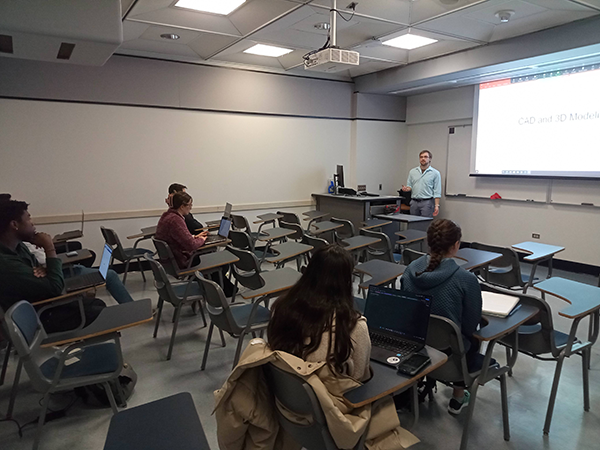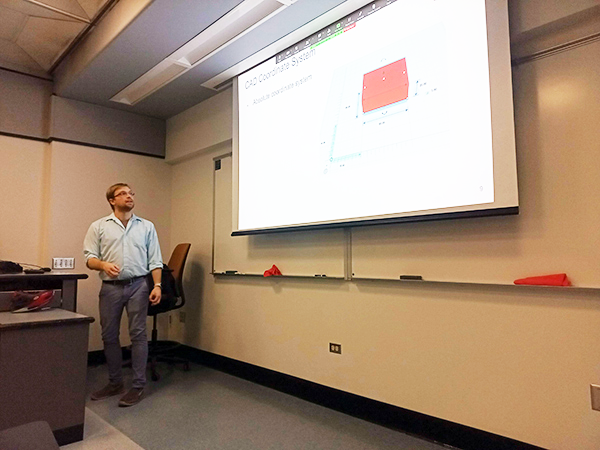A new course for prosthetics care
Between his studies, a teaching opportunity, and nonprofit work, mechanical engineering Ph.D. student Jonathan Shulgach looks to reimagine the experience of receiving medical care by bringing patients closer to the process.
Jonathan Shulgach will tell you that Star Wars is a big deal to him and his work—and he’s not exaggerating. The second-year Ph.D. student is an aspiring engineer with a proven passion for robotics. He is fascinated with human-technology interaction and how it might expand in the future.
“I definitely see myself in the future utilizing existent technologies, incorporating them into robotics, and getting them in the hands of people in the best way that benefits society,” said Shulgach. He had a unique opportunity to pursue that goal as a master’s student. About five years ago, Shulgach met Dylan Beam when they were working together at the Rehabilitation and Neural Engineering Lab in Pittsburgh. “We both had a passion for rehabilitation and restoration of human abilities,” Shulgach said. “We were also really into 3D printing and prosthetics. I was always interested in how we can make prosthetics better, and Dylan always talked about how we can make what currently exists available to more people.”
Then in 2020, as so many things were put on pause due to the COVID pandemic, Beam began the process of founding a nonprofit called the Accessible Prosthetics Initiative (API) with its mission of increasing access to prosthetic technologies and care on a national scale. Their mutual interests and the way Beam described API’s vision were what drew Shulgach in to be on the pilot team of volunteers. “It was not only about sharing what is available in terms of cheap, affordable prosthetics for people that don’t have them but also taking it one step further and trying to bring clinicians and patients together for a nonprofit,” Shulgach said. “I haven’t seen that before.”
Part of making prosthetics more accessible involves listening to the needs of the users firsthand. To do this, API coordinated with Amputee Coalition, a national support and advocacy group for people affected by limb loss. API began attending their online meetings and learned about each member’s prosthetic uses, as well as the obstacles they face in obtaining and affording a prosthetic that fits well. Those conversations were also valuable for API to understand some of the ergonomic design challenges that still exist with common affordable prosthetics, and sparked ideas to pass on to STEM students learning engineering design.
Shulgach has been a part of API since its founding, and after three years, he has settled into an educational role at the organization. An engineering student himself and a former coach for robotics teams in Baltimore, Shulgach uses his insight into current advancements with prosthetic technologies to help develop the education team’s curricula, which have been used for several summer STEM programs. Although Shulgach is eager to build his mechatronics career, he’s also invested in the education of fellow aspiring engineers—particularly those who will go into the medical field—which led him to an opportunity to design a graduate bioengineering course at the University of Pittsburgh.
“Something that I’ve seen in industry and education is that the best way to prepare the next workforce generation is to make sure that they have this technical literacy, or core comprehension of a current skill set to safely and responsibly do tasks,” Shulgach explained.
Something that I’ve seen in industry and education is that the best way to prepare the next workforce generation is to make sure that they have technical literacy.
Jonathan Shulgach, Ph.D. student, Mechanical Engineering
“But for prosthetics in particular, it seemed pretty slow, or it wasn’t easy to see commercially available devices that were following the same rate of growth as collaborative open-source design resources. So, one of the things that we were thinking of is, ‘How do we focus the student population and particularly college-level students that are soon to go into the workforce and industry, and to prosthetics and orthotics? What kind of tools can we give them?’”
It turns out that Goeran Fiedler, an associate professor in the University of Pittsburgh’s Department of Rehabilitation Science and Technology, had similar concerns. API and Fiedler collaborated to construct a unique syllabus with topics and guest speakers for a pilot master’s course, “User-Centered Design of Limb Prostheses,” which debuted during the Spring 2023 semester. The first half of the semester mainly focused on training, while the second half consisted of projects where students could apply the core design principles and communication skills to create custom prosthetics for patients.
With Fiedler as the official instructor for the course, Shulgach and another API education member, Matthew Shaw, were invited as guest lecturers to teach a unit covering 3D printing technologies and 3D design and modeling, emphasizing the importance of choosing the right materials and methods to create a useful tool based on the specific needs of the patient. The course is designed to put students in a big-picture mindset that helps them understand all the parts involved in connecting patients to resources.
“I think, ultimately, we wanted to find a system that we could implement in other areas that would give students the understanding that they needed to talk to prosthetists in the industry, and then, from a high-level perspective, make the decisions that could connect or bring people together, bring a patient and clinicians or prosthetists together, and designers, to include everyone in the conversation and not make it a blind step-by-step-by-step process.”
Not unlike Star Wars, Shulgach’s efforts with Fiedler and API’s education team promote his futuristic vision for what prosthetics care could look like with a holistic approach that forms a dialogue between patients and professionals. By bringing patients closer to the process and letting them communicate their needs, medical providers can accommodate them.


